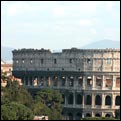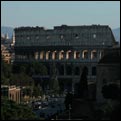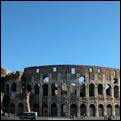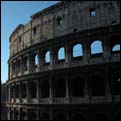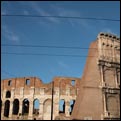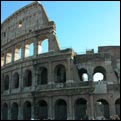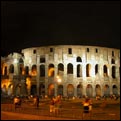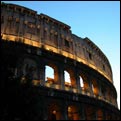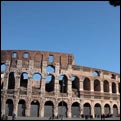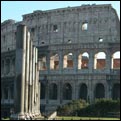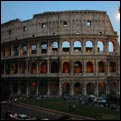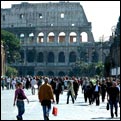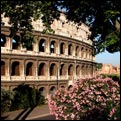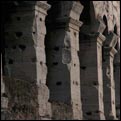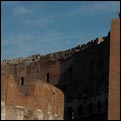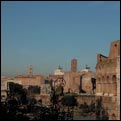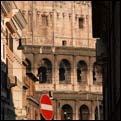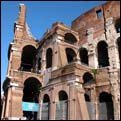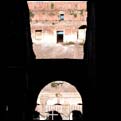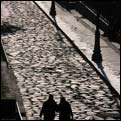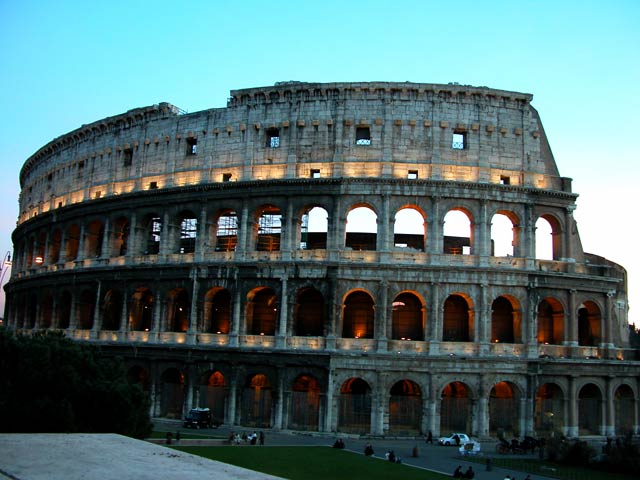
first part
The Colosseum is the most stupendous thing in Rome. Statistics give little idea of its magnitude and no idea at all of its impressiveness, but, if you wish to have the figures, here they are: the outer walls were 157 feet high, and the seats extended down from this point in banks or steps almost to the level of the arena. The entire building measured 658 feet in length, the arena itself being about three hundred feet. An inscription of the fourth century states that the Colosseum contained 87,000 loci, which until recently was taken to mean seats for spectators. Professor Huelsen, however, has advanced a theory, now generally accepted, that the loci refers not to seats but to feet of bench space; that each spectator must have occupied eighteen or twenty inches of space, and that accordingly there could not have been room for more than fifty thousand or so. Professor Huelsen probably never rode in an American street-car, and may not have made sufficient allowance for the compressibility of a crowd, but whether fifty thousand or a hundred thousand, the Colosseum certainly accommodated a good-sized audience, and no modern theatre manager could have more skilfully handled it than did those Romans of the Flavian age.
Each of the eighty arches upon the ground formed an entrance and exit, and a wide corridor beneath the banks of seats encircled the building, communicating by means of transverse corridors or tunnels with the auditorium. It is estimated that the building could be emptied in about ten minutes. Every spectator had his ivory ticket, admitting him by section, entrance, row, and seat. Each of the various orders—senators, knights, soldiers, freedmen, or whatever — had its own distinct section, and, later, individuals seem to have acquired permanent sittings upon which their names were inscribed. About two hundred of these names have been discovered cut in the stone which formed the benches. But what of the arena? We used to think of it as an open space upon the solid ground, but this was a misconception. It was, rather, a floor of heavy planks covered with sand (hence its name), and beneath it was a basement with rooms and passages, in which beasts, gladiators, and Christians were kept until wanted for the entertainment of the crowd. Trap-doors and elevators communicated with the arena, affording a means of entrance for the living and exit for the dead. An underground passage connected this basement with the substructures of the Temple of Claudius, which we have seen upon the Ccelian Hill, and in which was kept the main supply of beasts. Thus we have a perfect stage arrangement and accommodations for all the actors in the most terribly realistic tragedy that has ever been presented for the entertainment of mankind. When naval spectacles were wanted, the arena was flooded almost to the level of the podium, and triremes manned by slaves engaged in fierce conflict until the men went down, one by one, bruised and wounded and drowning, and none was left to fight. The Colosseum is a marvellous ruin under any sky and at any hour, but, if you wish it thoroughly to enthral you and to take from you all consciousness of present time and of self, you must see it by moonlight. The guidebooks and the doctors will tell you that you must remain indoors after sundown, but the chances are that you will do as you please about it. You have perhaps already transgressed. An evening at some little open osteria, or a stroll down the Corso has drawn you out and proved a greater attraction than the conversation of fellow tourists in your hotel parlour. Hence you will not refuse to go with me and see this greatest of Roman ruins under lunar auspices. Try now to forget how long the Colosseum is, and how high. Forget all that discussion about the number of spectators that it held, and how the animals were brought into the arena. Think of it not as a curiosity but as a poem, — and the moonlight will sink into you and filter through you and finally will reach your soul. The spirit of the place is now upon you. Close your eyes and see these tiers of benches peopled again with a Roman populace. Domitian sits in his imperial chair, while before him in the arena stands a company of gladiators, with their salutation : " Ave, Imperator, morituri te salutant." Above, the softened light streams down through silken awnings ; around, the air is fragrant with the spray of perfumes from a hundred fountains ; eager and expectant, the great throng lean forward, praetor and aedile, matron and Vestal Virgin, with the mob above and behind them, waiting for the slaughter to begin. When the gladiators have hacked and stabbed each other and the less skilful is down on the bloody sand with the victor's knee upon his breast, the crowd yells in a frenzy of delight, and the thumbs of Domitian and of the knights and senators and of the Vestal Virgins are all turned down as a sign that no mercy shall be given. The victor plunges his sword into the throat of his victim, and the first act is done. Then come wild beasts into the arena, — lions from the Libyan desert, wild bulls and aurochs from the Northern plains, elephants from the East, great brown bears from the forests of Gaul, — tearing each other in their rage and filling the vast amphitheatre with discordant cries, while to the intense delight of the spectators a company of Christians are thrown in to fight, or be destroyed. Then the beasts are killed by a horde of attendants, and, when the butchery is over, the multitude, drunk with the sight of blood, more savage than the beasts themselves, rush out through the vomitoria, and the Colosseum is deserted. You open your eyes. There are the outlines of the great arena. The moon has passed behind a cloud, and for an instant you cannot bring yourself back to the present. You look down expecting to see the animals and their victims, expecting some such sight as Dore has pictured, — the lions feasting upon the bodies of the slain while the hosts of heaven descend to welcome the souls of the martyrs. But the moon comes out again and bathes the ruin in a flood of splendour. It throws white bars of light into the dark openings where of old were kept the beasts; it throws black shadows under the arches at our back; it touches with a fringe of silver the crumbling tiers of stone. The nightingales are singing from the ilexes beyond the Arch of Constantine, and looking again into the arena you see a half-circle of white light, and another halfcircle of lights and shadows, where the moon beams play among the excavated tiers of masonry. Moonlight and shadow and silence! If one sees the Colosseum thus, he will carry the picture with him forever, for it is the most thrilling experience which he can have of the Eternal City.
ROME By Walter Taylor Field - 1905
ALMOST all the beauty which had till the time of our grandfathers made of the Colosseum the most mysterious and most astounding ruin in Rome, contriving out of its mere size something monstrous, spellbound, has departed from it, perhaps for ever, since it has come within the radius of action, so unfortunately wide, of the improver and the restorer of ruins. With the destruction of those trees that grew along the broken arches, waving "dark in the blue midnight and with the passing of the flowers, the Flavian Amphitheatre has become almost absurd in its rueful nakedness ; a sort of inadequate monstrosity, a mighty heap of patched and ordered debris on the verge of the brickfield of the Fora and the lower slopes of the Esquiline Hill. Stripped and ashamed, with all its wounds exposed, to say nothing of the horrible patchwork of the archaeologists, it is now just a vast and empty shell, that indeed scarcely impresses us, mere size being after all but a poor claim upon our notice. Yet of old it seems to have been the most wonderful thing in the City. Quamdiu stet Colysaeus, stet et Roma., sang the pilgrims. While stands the Colosseum Rome shall stand, when falls the Colosseum Rome shall fall, and when Rome falls the world. And yet something of its original splendour, if not of its medieval mystery, has been restored to it with the driving of the Via dell'Impero from the Forum of Trajan and the foot of the Capitol to the Colosseum which now closes a magnificent vista. But look at any picture of it as it was even so recently as the seventeenth and eighteenth centuries and you will realise at once what we have lost. Begun by Vespasian, in the gardens of the Golden House, on the site of the lake in which, like Narcissus, the son of Agrippina had adored his own beauty, it was finished by Titus, and is really, like the Pyramids, the work of the Jews, whose lives here too were " bitter with hard bondage in mortar and in brick"; for since the whole structure was completed within three years, doubtless " all their service, wherein they made them serve, was with rigour" Who the architect may have been we know not ; but his work was finished in the year 80, and the Flavian Amphitheatre, as it was called, opened with a great spectacle.
An amphitheatre, that at Capua as this in Rome, was generally an oval building surrounding an ellipse covered with a floor of planks resting on deep subterranean walls among which the machinery and the cages of the beasts were placed. Within, the walls were lined with scats tier above tier, and without were arcades one above another, the lowest admitting to a corridor which ran round the building and from which a staircase led up to the different rows of seats. Here, in the Colosseum, there were four arcadesthe first of Doric, the second of Ionic and the third of Corinthian columns, while the fourth was a wall decorated with Corinthian pilasters and pierced with windows. Within, immediately round the arena, a high and massive wall was built, within which were caves and vaults for animals. Above this, and protected by it, was the podium, where the seats of honour were placed for the Emperor and his family, for the Vestal Virgins and the great officers of the State, Above the podium, rose, in terrace after terrace, the seats for the Senators, for the magistrates and military knights, and then for the male citizens, while the women sat in the highest part of the building under a colonnade, parts of which, we are told, were portioned off for the common people. The whole of this vast space, capable, it is said, of seating more than seventy thousand persons, 1 was sheltered from sun and rain by an awning supported on masts set in corbels of stone that jutted out from the wall that on high surrounded the building, while an ingenious contrivance allowed the arena to be flooded with water for those naumachiat or naval fights to which Julius Caesar had first accustomed the Romans in the Circus Maximus in 46 B,O " The the "tre thus completed in A,D. 80 was certainly the most tremendous stage the world has ever seen, nor did it stand alone in mere size, for the spectacle there provided remains the most monstrous of which any word has come down to us. Splendid and even marvellous in the harmony, largeness, and grace of its construction, the Flavian Amphitheatre is altogether lost sight of as a building in its tremendous moral significance. For more than two thousand years its true name has been lost, in that of the Colosseum ; and this marks not merely a physical fact obvious to the most superficial observer, but a spiritual truth also, of rarer significance. It was this monstrous colossus that overthrew Paganism and the Empire and served as the stage on which Christianity was at last to meet them both in combat and defeat them. It might seem that no people save the Romans, no European people at any rate, have made of agony and death a spectacle to amuse the populace. They alone were ignorant of pity. The clemency that seemed to them so strange and even wonderful in Julius Caesar is but a proof of the hardness, even the brutality, of the national manners. They seem, and their art continually proves what their manners have led us to expect, to have been lacking in imagination; not in force or in that mental grasp of the things of the great world which was an instinct almost unconscious and perhaps ineradicable ; but in imagination, a kind of reverie, or shall I say a clairvoyance, which would have made such a thing as the Flavian Amphitheatre and all that it stood for impossible, a nightmare haunting the moral consciousness the soul.
Beginning, perhaps, with a genuine indifference to suffering, a certain hardness that was part of their strength, little by little this insensibility to suffering for which no shame or horror was really intolerable, so that the father would, without too intolerable a pain, condemn his son to death and even himself be his executioner, while such a punishment as that to which the faithless Vestal was condemned seems to have revolted no one encroached on the soul, till cruelty, a kind of joy in speculating on the endurance of others, less indifferent certainly, put to the most dreadful of tests, came to be with them a kind of delight, which, secretly at first, but altogether openly at last, involved all their pleasures, their public entertainments in its marvellous horror. From the enjoyment of watching the skill of two trained gladiators, or of a gladiator,, in dealing with a wild beast, there was but a step, it seems, to the breathless delight of seeing the appalled antics of some wretched criminal in the power of the lion or the bear, to the stripping of women and children at the mercy of a host of animals, to the long expectancy, with as much sport as might be in the interval, of the inevitable death of the helpless at the hands yes, it came to just that- of that most brutal populace which was Rome, At first the gladiatorial combat had been but private sport offered amid the pomp of a funeral perhaps in memory of the Homeric Games I but already in the last years of the Republic these had come to be the favourite spectacles of the Roman people " Caesar used them to ga "n the love of the Pkbs ; but it was only under Augustus that they became, as it were, a national institution. That wily politician, intent on keeping Rome quiet, was able to boast in his last years that he had offered the people eight combats in which 10,000 gladiators had taken part. Little by little this lust for slaughter grew upon them until, under Domitian, the public shows, which of old came but twice in the year, were declared obligatory on ten days at least " But even this, in the "ight of what came later, seems but a beginning, for Trajan after his Dacian victories gave a contest which lasted 123 days and employed 10,000 gladiators, as many indeed as Augustus had used in twenty years " When at last the profe "sional gladiators no longer sufficed to appease the passion of the people, recourse was had to the lowest criminals and to prisoners from every part of the Empire. The thing became a sort of trade in which the tribunals acted as purveyors, and a regular service of caravans was ran along the great roads from Gaul and Pannonia. But since many of these wretches gave but poor sport when matched either with one another or with a trained gladiator, they were most often reserved for the fight with beasts on the occasion of a triumph.
In that vast space resounding with terrible cries, we have stood beside our brothers, Germans from the far away Rhine, Bretons and Gauls, Dacians, Alains and Ethiopians, and those too, who were to avenge us, the Goths whose children under Alaric, only six years after the last combat, that which celebrated the victories of Stilicho under Honorius, thundered at the gates of the Eternal City. It was there in the awful din and horror, under the cruel eyes of those who had failed to understand, that our soul was born, that soul which was to make such a spectacle as that for ever impossible. And amid the bravery, the unspeakable courage and devotion of our friends who, a new love in their hearts, stood beside us, we, too, bewildered in the glaring sunshine did not disgrace the dream in our hearts. One day we read that thirty Saxons, as they were about to be led into the Circus, strangled themselves in their prison. All the fate of the world was decided in the arena of the Flavian Amphitheatre. It was Rome who stood there at the tribunal of humanity and heard the universal verdict guilty. Yes ; it was on the bloody floor of the Colosseum that Rome contrived her own slavery and our freedom. It was there that Christianity met the world and overcame it, there the martyrs won for Christ His Kingdom in the hearts of men and certain poor folk, almost nameless, men, women and children, weak too, weeping and afraid, overthrew for ever the despotism of Rome, So the Colosseum, that monument of our love, fallen into ruin, for it is the privilege of Love to forget the unforgettable, came in the Middle Age to be the most fabulous thing in Rome, and to serve rather than the Capitol even, differently too, as a symbol of the City : so that we sang to ourselves as we passed by, the old song of the English pilgrims :
Quamdiu stet Colysaeus
Stet et Roma:
Quando cadet Colysaeus
Cadet et Roma:
Quando cadet Roma
Cadet et Mundus,
And no one any longer remembered the cruelty of the Roman people. Yet dimly some memory of evil hung about it, " It is the old Temple of the Sun/' we would tell one another, as passing from church to church we climbed toward our mother S. Giovanni in Laterano ; till a rumour ran through the crowded, straggling ranks of the pilgrims, coming, it seemed, from one who was a clerk and had learning. And ever after we told ourselves that that vast ruin, dark with trees to its very summit, was the work of a magician, one Virgil, wise at his business, who in a song of passing sweetness had prophesied the joy of Our Lady and the birth of Christ. And thinking of this we passed on and on to the shrine of the Apostle, The Romans, however, cursed with hatred, had no such illusion, or, if they had, it profited them nothing. For, magical or no, the barons Frangipani and Annibaldi turned it into a fortress for civil war, till in 1312 the Emperor Henry VII took it from them and restored it to the Senate and the people. And as might have been expected, they used it, as well as they could, in the old fashion, organising there bull fights and such " Incorrigible Rome ! It "was only after the return of the Holy Sec from Avignon that these spectacles were put an end to, and the Colosseum, already in ruins, became a quarry for the Popes, From the earliest years of the Renaissance to its last moments under Paul III the walls were destroyed daily to furnish stone for the new buildings, till, deserted at last, it became the lair of wolves, which Julius II proscribed in 1512, setting a price on their heads " Again in the eighteent " century it was used for material till was it only to prevent further damage, or may we sec in it one of those acts of imagination on the part of the papacy, not so rare after all ? Benedict XIV consecrated it to " The Passion of Jesus Christ," Who in the place where so many martyrs confessed His Name and assured Him the victory, speaks neither of anger nor of punishment, but seems to remind us, there surely more than anywhere else in the world, of that " new commandment "that ye also love one another"
ROME BY EDWARD MUTTON - 1909

